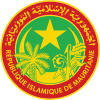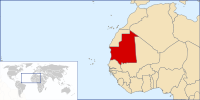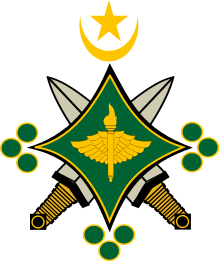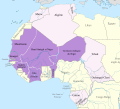Portal:Mauritania
The Mauritania Portal - بوابة موريتانيا
Mauritania, formally the Islamic Republic of Mauritania, is a sovereign country in Northwest Africa. It is bordered by the Atlantic Ocean to the west, Western Sahara to the north and northwest, Algeria to the northeast, Mali to the east and southeast, and Senegal to the southwest. By land area Mauritania is the 11th-largest country in Africa and 28th-largest in the world; 90% of its territory is in the Sahara. Most of its population of some 4.3 million lives in the temperate south of the country, with roughly a third concentrated in the capital and largest city, Nouakchott, on the Atlantic coast. The country's name derives from Mauretania, the Latin name for a region in the ancient Maghreb. It extended from central present-day Algeria to the Atlantic. Berbers occupied what is now Mauritania by the beginning of the third century AD. Groups of Arab tribes migrated to this area in the late seventh century, bringing with them Islam, Arab culture, and the Arabic language. In the early 20th century, Mauritania was colonized by France as part of French West Africa. It achieved independence in 1960, but has since experienced recurrent coups and periods of military dictatorship. The 2008 Mauritanian coup d'état was led by General Mohamed Ould Abdel Aziz, who won subsequent presidential elections in 2009 and 2014. He was succeeded by General Mohamed Ould Ghazouani following the 2019 elections, head of an autocratic government with a very poor human rights record, particularly because of its perpetuation of slavery; the 2018 Global Slavery Index estimates there are about 90,000 slaves in the country (or 2.1% of the population). Despite an abundance of natural resources, including iron ore and petroleum, Mauritania remains poor; its economy is based primarily on agriculture, livestock, and fishing. Mauritania is culturally and politically part of the Arab world; it is a member of the Arab League and Arabic is the official language. The official religion is Islam, and almost all inhabitants are Sunni Muslims. Despite its prevailing Arab identity, Mauritanian society is multiethnic; the Bidhan, or so-called "white moors", make up 30% of the population, while the Haratin, or so-called "black moors", comprise 40%. Both groups reflect a fusion of Arab-Berber ethnicity, language, and culture. The remaining 30% of the population comprises various sub-Saharan ethnic groups. (Full article...) Selected article -The Armed Forces of Mauritania (Arabic: الجيش الوطني الموريتاني, romanized: al-Jaysh al-Waṭanī al-Mūrītānī, French: Armée Nationale Mauritanienne) is the defense force of the Islamic Republic of Mauritania, having an army, navy, air force, gendarmerie, and presidential guard. Other services include the national guard and national police, though they both are subordinated to the Ministry of the Interior. As of 2018, the Mauritanian armed forces budget was 3.9% of the country's GDP. The military forces of Mauritania are listed by the IISS Military Balance 2007 as comprising 15,870 personnel with an additional 5,000 paramilitaries, in the national gendarmerie. The Navy (Marine Mauritanienne) has 620 personnel and 11 patrol and coastal combatants, with bases at Nouadhibou and Nouakchott. The CIA reports that the navy includes naval infantry. The small Air Force (Force Aérienne Islamique de Mauritanie, FAIM) has 250 personnel, 2 FTB-337 aircraft, 15 transport aircraft of various types, and 4 SF-260E trainers. The 5,000 paramilitaries are divided in the National Gendarmerie (3,000), and the National Guard (2,000) who both report to the Ministry of the Interior. Other paramilitary services reported by the CIA in 2001 include the National Police, Presidential Guard (BASEP). (Full article...) This is a Good article, an article that meets a core set of high editorial standards.
Mauritania competed at the 2008 Summer Olympics which was held in Beijing, China. The country's participation at Beijing marked its seventh appearance in the Summer Olympics since its debut in the 1984 Summer Olympics. The delegation included two track and field athletes, Souleymane Ould Chebal and Bounkou Camara, who were both selected by wildcards after both failed to meet either the "A" or "B" qualifying standards. Chebal was selected as the flag bearer for the opening ceremony. Neither of the Mauritanians progressed beyond the heats. (Full article...) CategoriesGeneral images -The following are images from various Mauritania-related articles on Wikipedia.
Related portalsWikiProjects
Topics in MauritaniaCities and towns
CommunesAssociated WikimediaThe following Wikimedia Foundation sister projects provide more on this subject:
Discover Wikipedia using portals | ||||||||||||||||||||||||||||||||||||||||||||||||||||||||||||||||||||||||||||||||||||||||||||||||||||||||||||













































